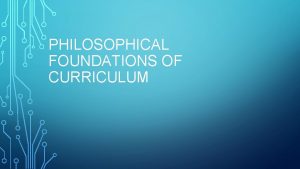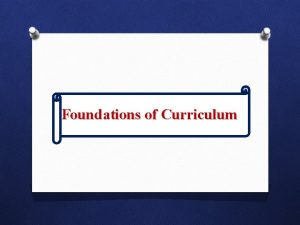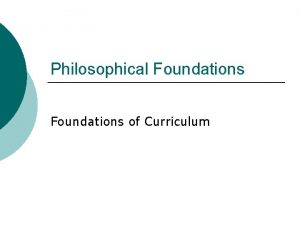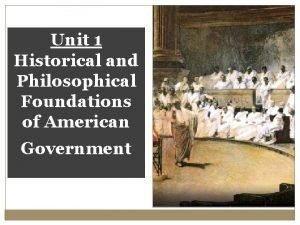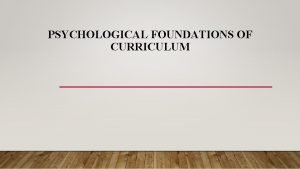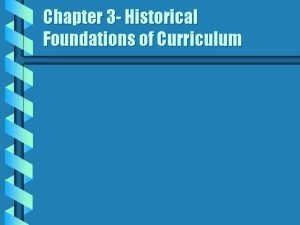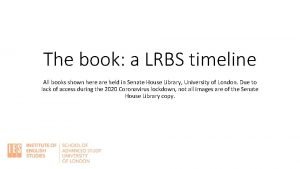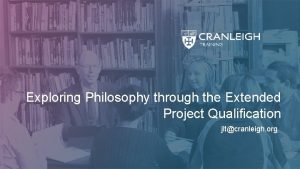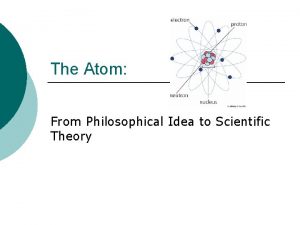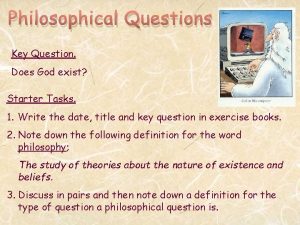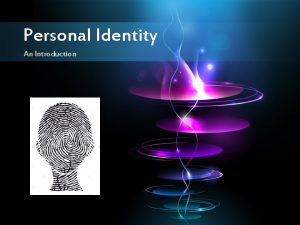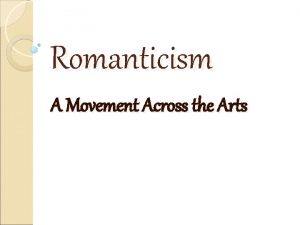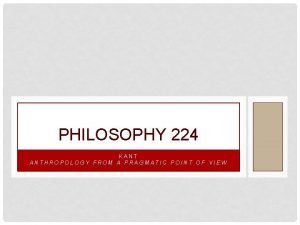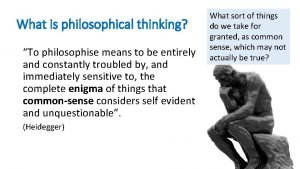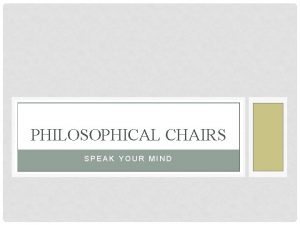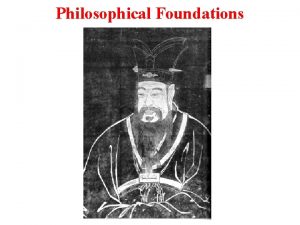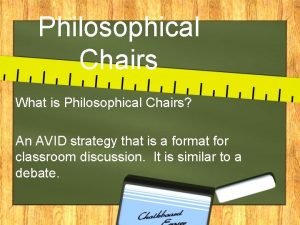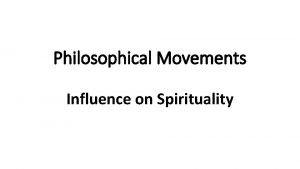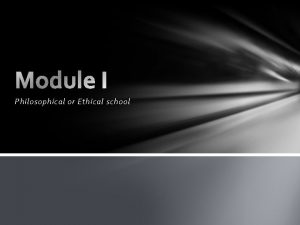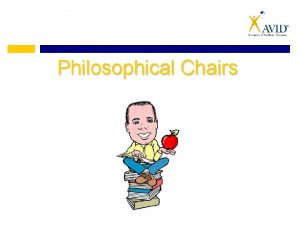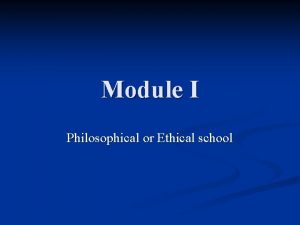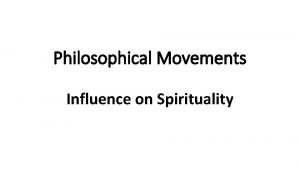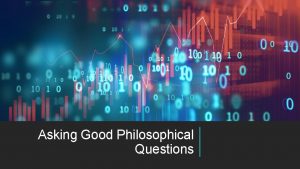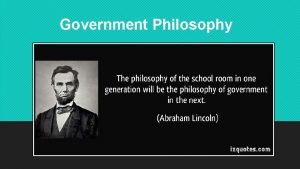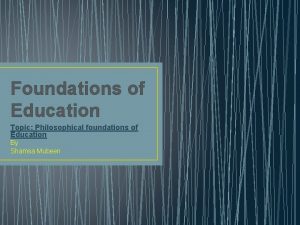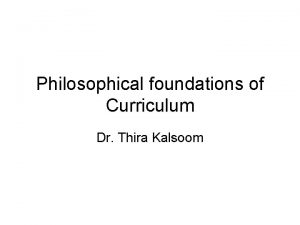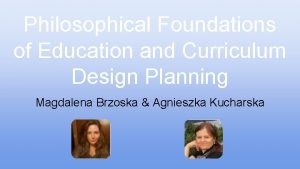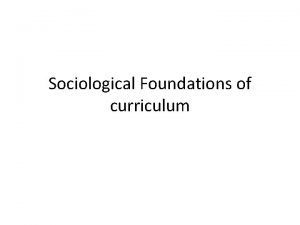PHILOSOPHICAL FOUNDATIONS OF CURRICULUM WHAT ARE CURRICULUM FOUNDATIONS
















- Slides: 16

PHILOSOPHICAL FOUNDATIONS OF CURRICULUM

WHAT ARE CURRICULUM FOUNDATIONS? • Curriculum Foundations are those basic forces that influence and shape the content and organization of the curriculum.

PHILOSOPHY AND CURRICULUM • Philosophy provides educators, especially curriculum workers, with a framework for organizing schools and classrooms. • It helps them determine what schools are for, what subjects have value, how students learn, and what method and materials to use. • It clarifies education’s goals, suitable content, teaching and learning processes, experiences and activities that school should emphasize. • It also give us basis for deciding which textbook to use, how to use them, and how much homework to assign, how to test students and use the test results and what subject matter and content to emphasize?

PHILOSOPHY AND THE CURRICULUM WORKER • There are two major issues that influence the curriculum worker. • Conflict – Curriculum workers can be very passionate in their views about curriculum. If the curriculum worker is too inflexible with their philosophy it will be very difficult to work together with others who do not share the same ideals. • Lack of clear philosophy – If the curriculum worker is not clear on what exactly they believe in. The specialist would be to easily influenced by the philosophies of others and therefor would have difficulty making important curricular decisions. • A good curriculum worker should be clear about what philosophies they believe in but also be able to adapt their views when presented with

PHILOSOPHY, THE MAIN CURRICULUM SOURCE • In order to develop curriculum one must begin with a basic philosophy or set of beliefs in which to govern the curricular decisions. According to our text Ornstein&Hunkins (2013), Dewey had the idea that one’s philosophy is the starting point in curriculum development. And although Tyler believed that philosophy was one of a five component system in creating curriculum he places more emphasis on philosophy and refers to it as “the first screen” in curriculum development. Goodlad’s ideas were that one must first reflect upon the social order before curriculum development can occur but Dewey reminds us that even the idea of thinking about the social aspect of education versus the individual has been a philosophical issue in it’s self. So, just the idea of beginning with the nation-state already had philosophical ideals

TYLER’S VIEW OF PHILOSOPHY IN RELATION TO SCHOOL PURPOSE Studies of learner s Use of philosoph y Suggesti on from subject specialis t School purposes Studies of contempo rary life Use of psycholo gy learning

MAJOR PHILOSOPHIES • Paradigms on the basis of which we interpret and understand the world • Idealism • Realism • Pragmatism • Existentialism

MAJOR PHILOSOPHIES • They shape and influence educational philosophies • how/what we believe about what is real and valuable or the meaning of life shapes who we are as teachers • how/what we believe about how knowledge is acquired shapes our approach to teaching • our beliefs about what is right/good/beautiful/valuable impact the learning in our classroom

Philosophy Reality Knowledge Values Teacher's role Emphasis on learning Idealism Spiritual, moral or mental: unchanging Rethinking latent ideas Absolute and To bring eternal latent knowledge and to consciousne ss; to be a moral and spiritual leader Recalling knowledge and ideas; abstract thinking is highest form Knowledge based; subject based; classic or liberal arts, hierarchy of subjects: philosophy, theology and mathematics are most important Realism Based on natural laws; objectives and composed of matters Consists of sensation and abstraction Absolute and eternal based on nature’s laws Exercising the mind; logical and abstract thinking are highest form Knowledge based; subject based; arts and sciences; hierarchy of To cultivate rational thought; to be a moral and spiritual leader; to be an authority Emphasis on curriculum

pragmatism Interaction of individual with environment ; always changing Based on experience; use of scientific method Situational and relative; subject to change and verification To cultivate critical thinking and scientific processes Methods of dealing with changes environment and scientific explanations No permanent knowledge of subjects ; appropriate experiences that transmit culture and prepare individual for change; problem solving activities existentialis m subjective Knowledge of personal choice Freely chosen, based on individuals’ perception To cultivate personal choice and individual selfdefinition Knowledge and principles of human condition; acts of choosing Choices in subject matter, elective, emotional, aesthetic and philosophical objects

EDUCATIONAL PHILOSOPHIES • They emerge from one or more of the four major philosophical traditions. They range from traditional and conservative to contemporary and liberal. • Perennialism • Essentialism • Progressivism • Reconstructionism

Educatio Philosophica Aim of nal l base education philosop hy knowledge Role of Teacher Curriculum focus Related curriculum trends Perennialis Realism m To educate the rationale personal; to cultivate the intellect Focus on past and permanent studies; mastery of facts and timeless knowledge Teacher helps students think rationally; based on Socratic method, oral exposition; explicit teaching of traditional values Classical subjects; literary analysis; constant curriculum Great books, paideia, proposal; returning to the liberal arts Essentialis Idealism, m Realism To promote the intellectual growth of the individual person, to educate the competent person Essential skills and academic subjects; mastery of concepts and principles of subject matter Teacher is authority in particular subject aea; explicit teaching of traditional values. Essential skills and essential subjects ( English, science, math and foreign languages) Back to basics; cultural literacy; excellence in education

Educational philosophy Philosophi cal base Aim of education knowledge Role of Teacher Curriculum focus Related curriculum trends Progressivism pragmatism To promote democratic social living Knowledge leading to growth and development; a living learning process; focus on active and relevant learning Teacher is guide for problem solving and scientific inquiry Based on students’ interest; addresses human problems, and affairs; interdisciplinar y subject matter; activities and projects Relevant curriculum; humanistic education; radical school reform Reconstructioni sm pragmatism To improve and reconstruct society; to educate for change and social reform Skills and subjects needed to identify and ameliorate society’s problems; active learning Teacher serves as an agent of change and reform; acts as a project director and research Emphasis on social science and social research methods, examination of social, economic and International education; reconceptualis m; equality of educational opportunity

CONCLUSION § To a large extent curriculum reflects philosophy § According to Dewey it is as necessary for “ forming fundamental dispositions, intellectual and emotional, toward nature and fellow man. § Major philosophical viewpoints have emerged within curriculum field ( Idealism, realism, pragmatism and existentialism). They have view points traditional and conservative to contemporary and liberal. § They have influenced educational theories: prennialism , essentialism ( conservative and traditional) progressivism, reconstrucnism ( contemporary and liberal)

CONCLUSION § No single philosophy, old or new, should exclusively guide decisions about school and curriculum. § A school approach to curriculum be politically and economically feasible and it serve the needs of students and society.

THANK YOU
 Mikael ferm
Mikael ferm Philosophical foundations of curriculum
Philosophical foundations of curriculum Sociological foundation of curriculum
Sociological foundation of curriculum Curriculum trends in progressivism
Curriculum trends in progressivism Philosophical foundations of the american revolution
Philosophical foundations of the american revolution Learning is explained in terms of wholeness of the problem
Learning is explained in terms of wholeness of the problem Historical foundations of curriculum
Historical foundations of curriculum Philosophical transactions
Philosophical transactions Philosophical epq questions
Philosophical epq questions The atom: from philosophical idea to scientific theory
The atom: from philosophical idea to scientific theory Philosophical questions
Philosophical questions Philosophical questions about identity
Philosophical questions about identity Philosophical and artistic movement
Philosophical and artistic movement Tongue position classification
Tongue position classification Immanuel kant main ideas
Immanuel kant main ideas Philosophical thinking means
Philosophical thinking means Philosophical chairs rules of engagement
Philosophical chairs rules of engagement

